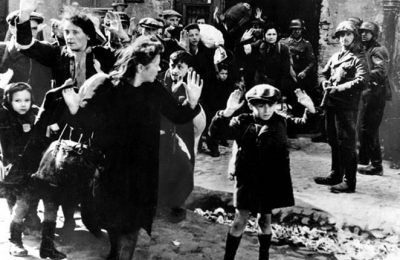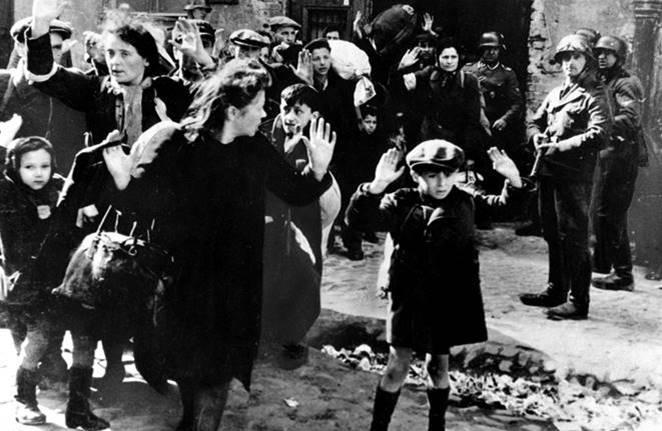They Thought They Were Free: The Germans, 1933-45
Child with His Hands Up: Milton Mayer’s Interview with a Good German

Iconic. This particular image is borrowed from this site.
Journalist Milton Mayer traveled to Germany in the wake of World War II to find out how ordinary, normally decent, educated German people got caught up, co-opted or neutralized in the horrible devolution of the country that ended in the atrocities with which we are all so familiar — and a World War that cost countless lives.
The book he wrote should be better known: They Thought They Were Free: The Germans, 1933-45 was published in 1955 by the University of Chicago Press.
There is an excerpt at the link, a chapter called “But Then It was too Late.” Under provisions of the U. of C Press copyright notice, included below, part of the excerpt is reproduced below.
***
“What happened here was the gradual habituation of the people, little by little, to being governed by surprise; to receiving decisions deliberated in secret; to believing that the situation was so complicated that the government had to act on information which the people could not understand, or so dangerous that, even if the people could not understand it, it could not be released because of national security. And their sense of identification with Hitler, their trust in him, made it easier to widen this gap and reassured those who would otherwise have worried about it…
“The dictatorship, and the whole process of its coming into being, was above all diverting.
It provided an excuse not to think for people who did not want to think anyway. I do not speak of your ‘little men,’ your baker and so on; I speak of my colleagues and myself, learned men, mind you. Most of us did not want to think about fundamental things and never had. There was no need to. Nazism gave us some dreadful, fundamental things to think about—we were decent people—and kept us so busy with continuous changes and ‘crises’ and so fascinated, yes, fascinated, by the machinations of the ‘national enemies,’ without and within, that we had no time to think about these dreadful things that were growing….
Each step was so small, so inconsequential, so well explained or, on occasion, ‘regretted,’
that, unless one were detached from the whole process from the beginning, unless one understood what the whole thing was in principle, what all these ‘little measures’ that no ‘patriotic German’ could resent must some day lead to, one no more saw it developing from day to day than a farmer in his field sees the corn growing. One day it is over his head….
“You see,” my colleague went on, “one doesn’t see exactly where or how to move. Believe me, this is true. Each act, each occasion, is worse than the last, but only a little worse.
You wait for the next and the next. You wait for one great shocking occasion, thinking that others, when such a shock comes, will join with you in resisting somehow.
You don’t want to act, or even talk, alone; you don’t want to ‘go out of your way to make trouble.’ Why not?—Well, you are not in the habit of doing it. And it is not just fear, fear of standing alone, that restrains you; it is also genuine uncertainty.
They say, ‘It’s not so bad’ or ‘You’re seeing things’ or ‘You’re an alarmist.’
“And you are an alarmist. You are saying that this must lead to this, and you can’t prove it.
These are the beginnings, yes; but how do you know for sure when you don’t know the end, and how do you know, or even surmise, the end? On the one hand, your enemies, the law, the regime, the Party, intimidate you. On the other, your colleagues pooh-pooh you as pessimistic or even neurotic. You are left with your close friends, who are, naturally, people who have always thought as you have.
“But your friends are fewer now…
“But the one great shocking occasion, when tens or hundreds or thousands will join with you, never comes.
That’s the difficulty. If the last and worst act of the whole regime had come immediately after the first and smallest, thousands, yes, millions would have been sufficiently shocked—if, let us say, the gassing of the Jews in ’43 had come immediately after the ‘German Firm’ stickers on the windows of non-Jewish shops in ’33. But of course this isn’t the way it happens.
In between come all the hundreds of little steps, some of them imperceptible, each of them preparing you not to be shocked by the next.
Step C is not so much worse than Step B, and, if you did not make a stand at Step B, why should you at Step C? And so on to Step D.
“And one day, too late, your principles, if you were ever sensible of them, all rush in upon you. The burden of self-deception has grown too heavy, and some minor incident, in my case my little boy, hardly more than a baby, saying ‘Jewish swine,’ collapses it all at once, and you see that everything, everything, has changed and changed completely under your nose. The world you live in—your nation, your people—is not the world you were born in at all. The forms are all there, all untouched, all reassuring, the houses, the shops, the jobs, the mealtimes, the visits, the concerts, the cinema, the holidays. But the spirit, which you never noticed because you made the lifelong mistake of identifying it with the forms, is changed. Now you live in a world of hate and fear, and the people who hate and fear do not even know it themselves;
“You have gone almost all the way yourself.
Life is a continuing process, a flow, not a succession of acts and events at all. It has flowed to a new level, carrying you with it…
Suddenly it all comes down, all at once. You see what you are, what you have done, or, more accurately, what you haven’t done (for that was all that was required of most of us: that we do nothing). You remember those early meetings of your department in the university when, if one had stood, others would have stood, perhaps, but no one stood. A small matter, a matter of hiring this man or that, and you hired this one rather than that. You remember everything now, and your heart breaks. Too late. You are compromised beyond repair.
“What then? You must then shoot yourself. A few did. Or ‘adjust’ your principles. Many tried, and some, I suppose, succeeded; not I, however. Or learn to live the rest of your life with your shame.
This last is the nearest there is, under the circumstances, to heroism: shame. Many Germans became this poor kind of hero, many more, I think, than the world knows or cares to know.”
*
Dr Kohls is a retired physician from Duluth, MN, USA. He writes a weekly column for the Duluth Reader, the area’s alternative newsweekly magazine. His columns deal with the dangers of American fascism, corporatism, militarism, racism, malnutrition, Big Pharma’s psychiatric drugging and over-vaccination regimens, and other movements that threaten the environment, prosperity, democracy, civility and the health and longevity of the planet and the populace. Many of his columns are archived at
http://www.globalresearch.ca/author/gary-g-kohls;
http://duluthreader.com/search?search_term=Duty+to+Warn&p=2; or at
https://www.transcend.org/tms/search/?q=gary+kohls+articles


